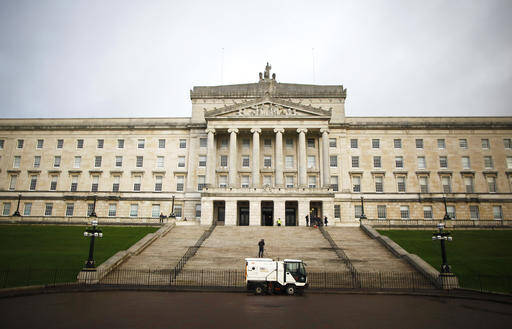Northern Ireland's shattered unity government will be dissolved next week to make way for an early election demanded by the coalition's main Irish Catholic party, the secretary of state for the British territory announced Monday.
Secretary of State for Northern Ireland James Brokenshire said the election to re-elect the Northern Ireland Assembly would be held March 2, six weeks after its dissolution.
Brokenshire's declaration became inevitable once the Irish nationalist Sinn Fein party refused hours earlier to fill its vacated top post in the nearly decade-old coalition with the major British Protestant party, the Democratic Unionists.
The warring parties face a potentially brutal election that could determine whether their unity government — centerpiece of Northern Ireland's peace accord—can ever be put back together again.
Brokenshire appealed to both camps not to make their relationship even worse with bitter accusations on the campaign trail.
"While it is inevitable that debate during an election period will be intense, I would strongly encourage the political parties to conduct this election with a view to the future of Northern Ireland and re-establishing a partnership government," Brokenshire told reporters at Stormont Castle, the center of power-sharing in Belfast.
At stake is the resurrection of cross-community government, a goal sought by generations of peacemakers as the most logical way to end a conflict that has claimed 3,700 lives since the late 1960s.
Against the odds of history, a government led jointly by the Democratic Unionists and Sinn Fein took office in 2007 and, until recent months, had governed the long-disputed corner of the United Kingdom with surprisingly few blow-ups.
Sinn Fein says it forced the government's collapse to protest the refusal of the Democratic Unionist leader, First Minister Arlene Foster, to step aside voluntarily.
As they left Stormont, Sinn Fein leaders accused the Democratic Unionists of poisoning their partnership by treating them abusively and refusing to be held accountable for the bungling of a "green energy" program overseen by Foster.
The program is expected to cost Northern Ireland, a land of barely 1.8 million citizens, 500 million pounds ($600 million) in ill-regulated and open-ended subsidies.
"There can be no return unless there's fundamental change in how the DUP approach power-sharing," Sinn Fein lawmaker Conor Murphy said.
Foster, who was forced from office when Sinn Fein counterpart Martin McGuinness resigned a week ago, accused Sinn Fein of pursuing another election barely 10 months after the last one to advance its own political ambitions.
"They have forced an election that risks Northern Ireland's future and its stability and suits nobody apart from themselves," said Foster, who became Northern Ireland's first female leader 12 months ago.
Analysts agree that Sinn Fein hopes to overtake the Democratic Unionists and become Northern Ireland's No. 1 party for the first time, gaining the symbolically potent right to hold the post Foster previously held.
Foster's party won 38 of the assembly's 108 seats in the May 2016 election, Sinn Fein 29.
Copyright 2017 The Associated Press. All rights reserved. This material may not be published, broadcast, rewritten or redistributed.








